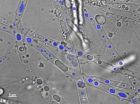(Press-News.org) A University of Sheffield academic is helping a team of citizen scientists to carry out crucial research into European genetic heritage.
Citizen Scientists are not required to have a scientific background or training, but instead they possess a passion for the subject and are increasingly being empowered by the scientific community to get involved in research.
Dr Andy Grierson, from the University of Sheffield's Institute for Translational Neuroscience (SITraN), has helped a team of citizen scientists from Europe and North America to identify vital new clues to tell the story of Europe's genetic history.
Dr Grierson explained: "Understanding European history since man first arrived on the continent is a huge challenge for archaeologists and historians.
"One way that scientists can help is by studying the genetics of European men. All men carry a Y chromosome that they inherit from their father, which has been passed down the generations from father to son for thousands of years. So most men in Europe will share common ancestry at some point in the past, and we are able to investigate this shared ancestry using genetic studies of the Y chromosome.
"However, up until recently, there have not been many genetic clues on the Y chromosome to allow scientists to be certain about identifying different populations."
The team has addressed this problem by downloading human genome data obtained by the 1000 Genomes Project from the Sanger Centre in Cambridge. Then, working on their home computers, they managed to extract 200 novel genetic variants from Y chromosomes of the most numerous group of western European men.
By determining the patterns of these markers in each of the 1000 Genomes Project samples, the team was able to draw up a new family tree for the majority of men in Western Europe.
The group hopes that this resource will allow a much more detailed analysis of migration and expansion of populations in Europe. For example, some of the new genetic markers may help to study the origins and movements of different historical and cultural groups such as the Celts.
Dr Grierson added: "This community-led approach to genetic research could easily be adopted by other research areas. In particular, the 1000 Genomes Project has made the whole genome sequence of more than 2,000 individuals freely available for research purposes. These sequences potentially contain new information that will give important insight in diverse disciplines such as clinical medicine and evolutionary biology.
"One problem is that the amount of data analysis involved is huge, so working in partnership with citizen scientists allows us to move forward far more rapidly. There are thousands of science graduates, who for one reason or another have pursued non-scientific careers. Getting involved in citizen science projects is one way that these people can re-engage with research. Likewise many people with careers in IT and computing already have the sorts of skills required for analysing whole genome sequences in projects like ours."
Richard Rocca from Saddle Brook in New Jersey, USA, a community scientist involved in the project, said: "By searching through vital records such as birth certificates, many of us can trace our ancestry back several generations. The task is very time consuming, especially for those, like me, whose ancestors left Europe many generations ago. As gratifying as the results may be, once the paper trail ends, we are left to wonder about our deep ancestry. By working together, we were able to add many levels of detail to the genetic tree. I have no doubt that this new information will help some of us trace our individual ancestries back into pre-history."
Greg Magoon, from Manchester in Connecticut, USA, another community scientist involved in the project said, "It's a very exciting time for this field. The development and use of new genome sequencing technologies over the last few years along with the public availability of data obtained with these technologies, particularly from initiatives like the 1000 Genomes Project, are enabling us to make rapid progress in our understanding of historical human migrations and paternal lineages. We've tried to show how such progress can be facilitated by an engaged community of individuals, with varied and complementary skills, connected via the Internet."
###
Additional information
The research is due to be published in Plos ONE at 11pm BST, 5pm EST on 24 July 2012 and will be available at: http://dx.plos.org/10.1371/journal.pone.0041634
The University of Sheffield
With nearly 25,000 students from 125 countries, the University of Sheffield is one of the UK´s leading and largest universities. A member of the Russell Group, it has a reputation for world-class teaching and research excellence across a wide range of disciplines.
The University of Sheffield has been named University of the Year in the Times Higher Education Awards for its exceptional performance in research, teaching, access and business performance. In addition, the University has won four Queen´s Anniversary Prizes (1998, 2000, 2002, 2007). These prestigious awards recognise outstanding contributions by universities and colleges to the United Kingdom´s intellectual, economic, cultural and social life. Sheffield also boasts five Nobel Prize winners among former staff and students and many of its alumni have gone on to hold positions of great responsibility and influence around the world.
The University´s research partners and clients include Boeing, Rolls Royce, Unilever, Boots, AstraZeneca, GSK, ICI, Slazenger, and many more household names, as well as UK and overseas government agencies and charitable foundations.
The University has well-established partnerships with a number of universities and major corporations, both in the UK and abroad. Its partnership with Leeds and York Universities in the White Rose Consortium has a combined research power greater than that of either Oxford or Cambridge.
Follow-up exams for patients with celiac disease are often inadequate and highly variable, according to a new study in Clinical Gastroenterology and Hepatology, the official clinical practice journal of the American Gastroenterological Association (AGA).
"In the group of celiac disease patients that we observed, we found that very few of them had medical follow-up that would be in keeping with even the most lax interpretation of current guidelines," said Joseph A. Murray, MD, AGAF, of Mayo Clinic and lead author of this study. "Doctors and patients need to be aware of ...
EAST LANSING, Mich. — The key to successful global business expansion is spreading operations across multiple countries, rather than trying to dominate a region or market, according to a new study led by Michigan State University researchers.
In addition, since global expansion is costly for service industries, manufacturing industries will profit most, said Tomas Hult, director of MSU's International Business Center.
Led by Hult and Ahmet Kirca, associate professor of marketing, the study is the largest ever conducted to examine the effect of multinationality on firm ...
Spatial skills--those involved with reading maps and assembling furniture--can be improved if you work at it, that's according to a new look at the studies on this topic by researchers at Northwestern University and Temple.
The research published this month in Psychological Bulletin, the journal of the American Psychological Association, is the first comprehensive analysis of credible studies on such interventions.
Improving spatial skills is important because children who do well at spatial tasks such as putting together puzzles are likely to achieve highly in science, ...
This press release is available in German.
Leipzig. Fungi are found throughout the soil with giant braiding of fine threads. However, these networks have surprising functions. Only a few years ago researchers from the Helmholtz Centre for Environmental Research (UFZ) discovered that bacteria travel over the fungal threads through the labyrinth of soil pores, much the same as on a highway. Now, together with British colleagues from the University of Lancaster, the UFZ researchers have come upon another phenomenon. Accordingly, the fungal networks also transports contaminants ...
PROVIDENCE, R.I. – Although erectile dysfunction (ED) has been shown to be an early warning sign for heart disease, some physicians – and patients – still think of it as just as a natural part of "old age." But now an international team of researchers, led by physicians at The Miriam Hospital, say it's time to expand ED symptom screening to include younger and middle-aged men.
In an article appearing in the July issue of the American Heart Journal, they encourage physicians to inquire about ED symptoms in men over the age of 30 who have cardiovascular risk factors, such ...
Complex, multi-system diseases like myotonic dystrophy – the most common adult form of muscular dystrophy – require physicians and patients to identify which symptoms impact quality of life and, consequently, what treatments should take priority. However, a new study out this month in the journal Neurology reveals that there is often a disconnect between the two groups over which symptoms are more important, a phenomenon that not only impacts care but also the direction of research into new therapies.
"In order to design better therapies we must first develop a clear ...
New Rochelle, NY, July 25, 2012—A novel approach to gene therapy that instructs a person's own cells to produce more of a natural disease-fighting protein could offer a solution to treating many genetic disorders. The method was used to achieve a 2- to 3-fold increase in production of a protein deficient in patients with Friedreich's ataxia, as described in an article published Instant Online in Human Gene Therapy, a peer-reviewed journal from Mary Ann Liebert, Inc. (http://www.liebertpub.com) The article is available free online at the Human Gene Therapy website (http://www.liebertpub.com/hum).
The ...
ARLINGTON, Va.—The Office of Naval Research (ONR) is looking at birds' perceptual and maneuvering abilities as inspiration for small unmanned aerial vehicle (UAV) autonomy, and Popular Science is featuring this effort in its August issue, posted online July 25.
An ONR-funded, five-year Multidisciplinary University Research Initiative (MURI) program is examining the control and behavioral processes of birds and other small animals when flying at high speeds through complex environments, such as forests or urban settings. Researchers are trying to understand why birds make ...
BUFFALO, N.Y. -- A new study from the University at Buffalo's Research Institute on Addictions (RIA) has found a link between the consumption of caffeinated energy drinks mixed with alcohol and casual -- often risky -- sex among college-age adults.
According to the study's findings, college students who consumed alcohol mixed with energy drinks (AmEDs) were more likely to report having a casual partner and/or being intoxicated during their most recent sexual encounter.
The results seem to indicate that AmEDs may play a role in the "hook-up culture" that exists on ...
Many people, whether they know it or not, are philosophical dualists. That is, they believe that the brain and the mind are two separate entities. Despite the fact dualist beliefs are found in virtually all human cultures, surprisingly little is known about the impact of these beliefs on how we think and behave in everyday life.
But a new research article forthcoming in Psychological Science, a journal of the Association for Psychological Science, suggests that espousing a dualist philosophy can have important real-life consequences.
Across five related studies, researchers ...



